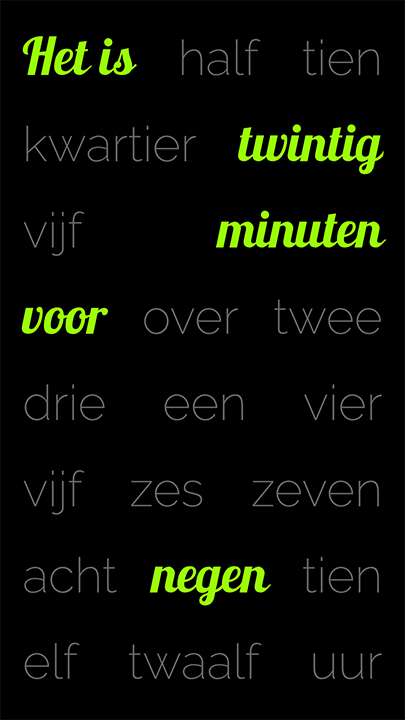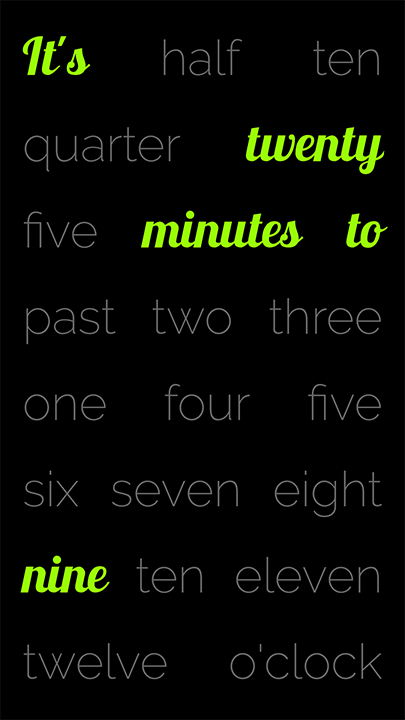Read the statement by Michael Teeuw here.
Help Translating Word Clock
-
@pjkoeleman Heh! No worries. Thanks for verifying. Hopefully others can help with the other languages.
-
I didn’t found that other module, thanks for pointing it out.
This is what I got so far, still a work in progress. The white square is supposed to be the rest minutes.
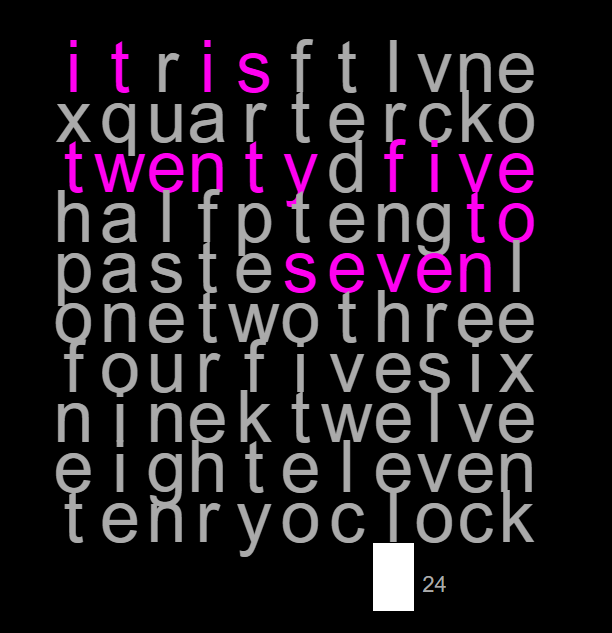
-
I join my predecessor @pjkoeleman
German Translation:
{ "ITIS": "Es ist", "HALF": "halb", "QUARTER": "viertel", "MINUTES": "Minuten", "TO": "vor", "PAST": "nach", "ONE": "eins", "TWO": "zwei", "THREE": "drei", "FOUR": "vier", "FIVE": "fünf", "SIX": "sechs", "SEVEN": "sieben", "EIGHT": "acht", "NINE": "neun ", "TEN": "zehn", "ELEVEN": "elf", "TWELVE": "zwölf", "TWENTY": "zwanzig", "OCLOCK": "Uhr", "THIRTEEN": "dreizehn", "FORTEEN": "vierzehn", "FIFTEEN": "fünfzehn", "SIXTEEN": "sechzehn", "SEVENTEEN": "siebenzehn", "EIGHTEEN": "achtzehn", "NINETEEN": "neunzehn", "THIRTY": "dreißig", "FORTY": "dierzig", "FIFTY": "fünfzig", "OH": "0?", "HUNDRED": "hundert", "ZERO": "null" }It’s one o’clock -> Es ist ein Uhr
It’s five minutes past one -> Es ist fünf nach eins (more common) / Es ist fünf nach ein Uhr
It’s ten minutes past one -> Es ist zehn nach eins (more common) / … ein Uhr
It’s quarter past one -> regional different: “Es ist viertel zwei” - “Es ist viertel nach eins / … ein Uhr”
It’s twenty minutes past one -> Es ist zwanzig Minuten nach eins / … ein Uhr
It’s twenty-five minutes past one -> Es ist fünfundzwanzig Minuten nach eins / Es ist fünf vor halb zwei (more common)
It’s half past one -> Es ist halb zwei (rounded up to next full hour)
It’s twenty-five minutes to two -> Es ist fünfunfzwanzig Minuten vor zwei / Es ist fünf nach halb 2 zwei (more common)
It’s twenty minutes to two -> Es ist zwanzig Minuten vor zwei / Es ist zehn nach halb 2 (more common)
it’s quarter to two -> regional differenz: “Es ist dreiviertel zwei” - “Es ist viertel vor zwei Uhr”
It’s ten minutes to two -> Es ist zehn Minuten vor zwei Uhr
It’s five minutes to two -> Es ist 5 Minuten vor zwei Uhr
It’s eleven o’clock (both 11:00 and 23:00) -> Es ist elf Uhr // Es ist dreiundzwanzig Uhr
It’s twelve o’clock (both 00:00 and 12:00) -> Es ist null Uhr // Es ist zwölf Uhr
It’s one o’clock (both 01:00 and 13:00) -> Es ist ein Uhr / Es ist dreizehn Uhr
Normaly we leave the “minutes” and “o’clock” away, like saying time in Dutch.
If you need more details, please ask. -
@clubbi Thank you! I’ll be adding this tonight along with a French translation.
One question: I notice a small difference in the first example:
It’s five minutes past one -> Es ist fünf nach eins (more common) / Es ist fünf nach ein Uhr
in the second example, there is no “s” at the end on “ein”. Does this mean when it’s on the hour (e.g.: 1:00) one would say “Es ist ein Uhr”, but when the word “Uhr” is not used, there is an “s”? (e.g.: “Es ist fünf nach eins”). Is the case for any other hours? I noticed it wasn’t for “Es ist fünfunfzwanzig Minuten vor zwei”
Also, is “Uhr” always capitalized? e.g.: would “Es ist elf uhr” be incorrect?
Cheers!
-
@j.e.f.f In German the additional “s” is only relevant for the number 1. So without “Uhr” the “s” is required and with a sentence with “Uhr” the “s” must be omitted.
“Uhr” is always capitalized. So your example “Es ist elf uhr” is incorrect. -
@clubbi @willfri OK here’s my attempt at making a German translation:
There were complications with having both “ein” and “eins” in the grid. So to avoid a special code case, for all times from 01:00 through 01:55, I always end with the word “Uhr.” I don’t do this for any other hours though… should I?
I took some creative license with displaying hours 13:00 through 19:00, as well as hours 21:00 through 23:00.
See both screenshots below for examples, and let me know if my translation works.
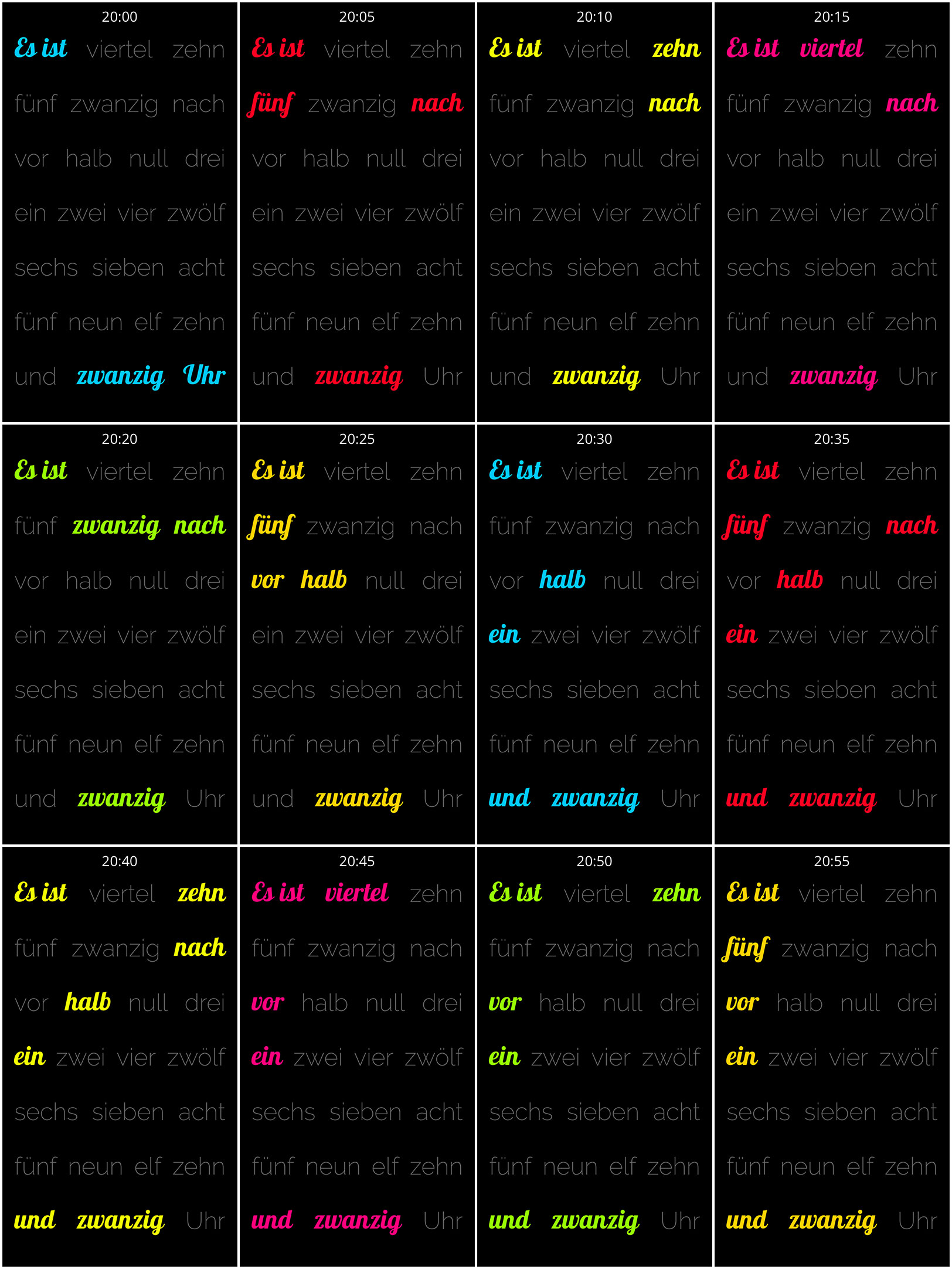
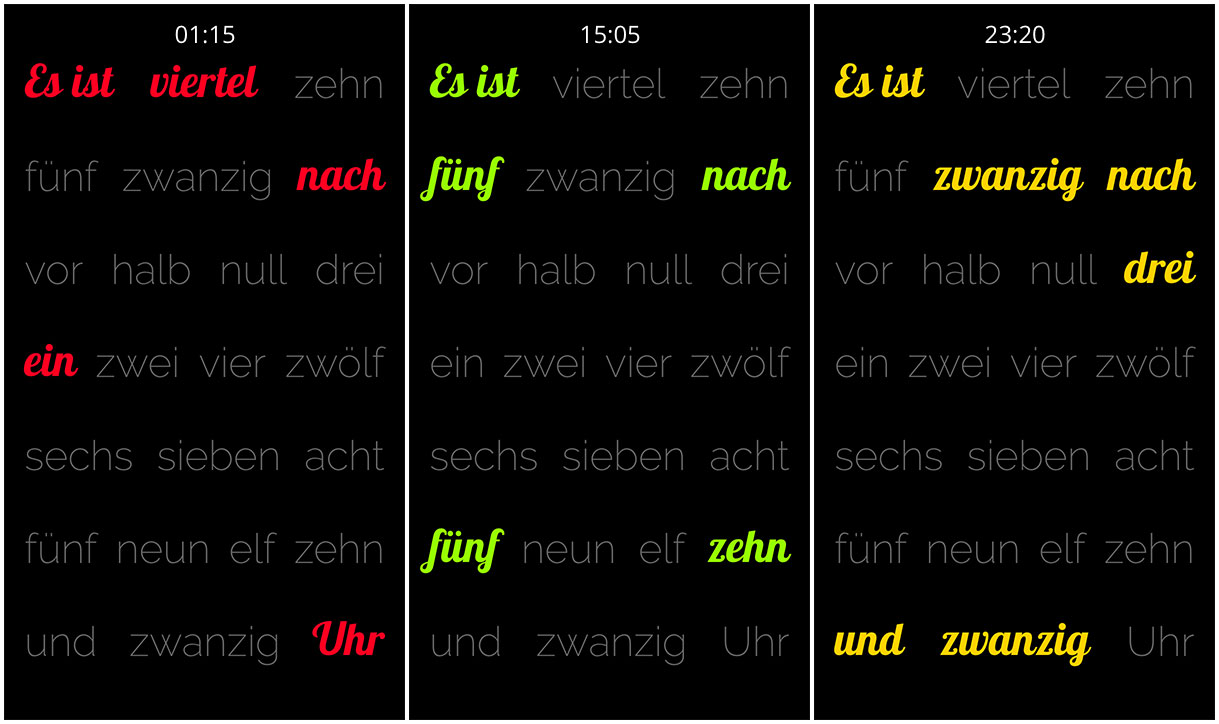
-
@j.e.f.f
First of all, German is not my main language, but there are some things I see.- 20:25 “Es ist fünf vor halb zwanzig” should be “Es ist fünf vor halb neun”, I would never use the “zwanzig” wenn I write the time like this or speak about the actual time.
- 20:30 is now written as “Es ist halb ein und zwanzig”. I think that has to be like in Dutch “Es ist halb neun”. Dutch and German look a lot the same.
- 20:35 schould be “Es ist fünf nach halb neun”
- 20:40 schould be “Es ist zehn nach halb neun”
- 20:45 schould be “Es ist viertel vor neun”
- 20:50 schould be “Es ist zehn vor neun”
- 20:55 schould be “Es ist fünf vor neun”
The use of “zwanzig” is strange in my opinion, but let some German speaking users decide how they want it to be.
-
@pjkoeleman it was my impression based @clubbi 's translation suggestion that the clock should show 24 hour time, which is why it is laid out as such.
@clubbi @willfri should this be a 24 hour clock or a 12 hour? Also note that it’s possible to have layouts for both styles, so I could add a German 12 hour clock in addition to keeping the current 24 hour layout.
-
@j.e.f.f How @pjkoeleman said I would also prefer a 12 hour layout because all times after 12 sounds strange in German.
Use “Uhr” only when it’s xx:00. The example at 01:15 should be “Es ist viertel nach eins”. So it would be better if you could find a solution for “ein” and “eins” because it sounds much better.
Some examples for better understanding:
- 00:30/12:30 “Es ist halb eins”
- 01:00/13:00 “Es ist ein Uhr” (use “ein” only here)
- 01:05/13:05 “Es ist fünf nach eins”
- 01:15/13:15 “Es ist viertel nach eins”
-
@willfri Thanks! A twelve-hour clock is easier for me to layout as well, so it looks like I’ll go that route. I’ve been thinking about a good way to handle the “s” on the end of “ein” and I think I have a good solution in mind that won’t be a special case just for the German layout.
I’ll post back new screenshots when I make the change.
